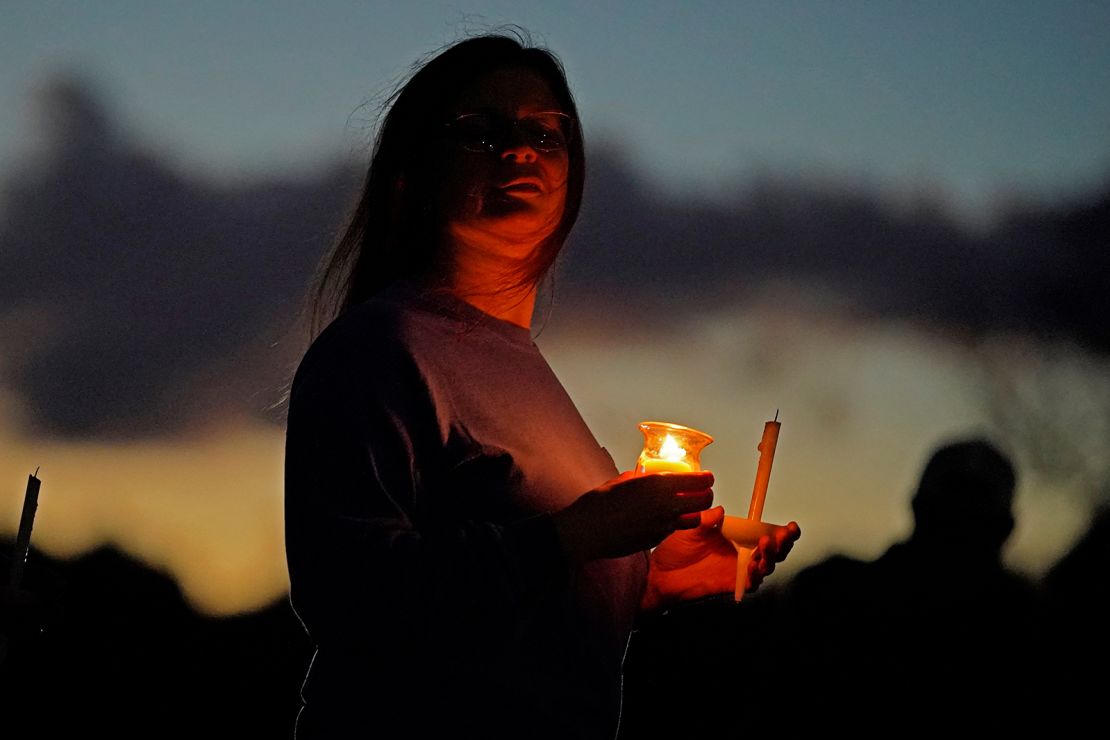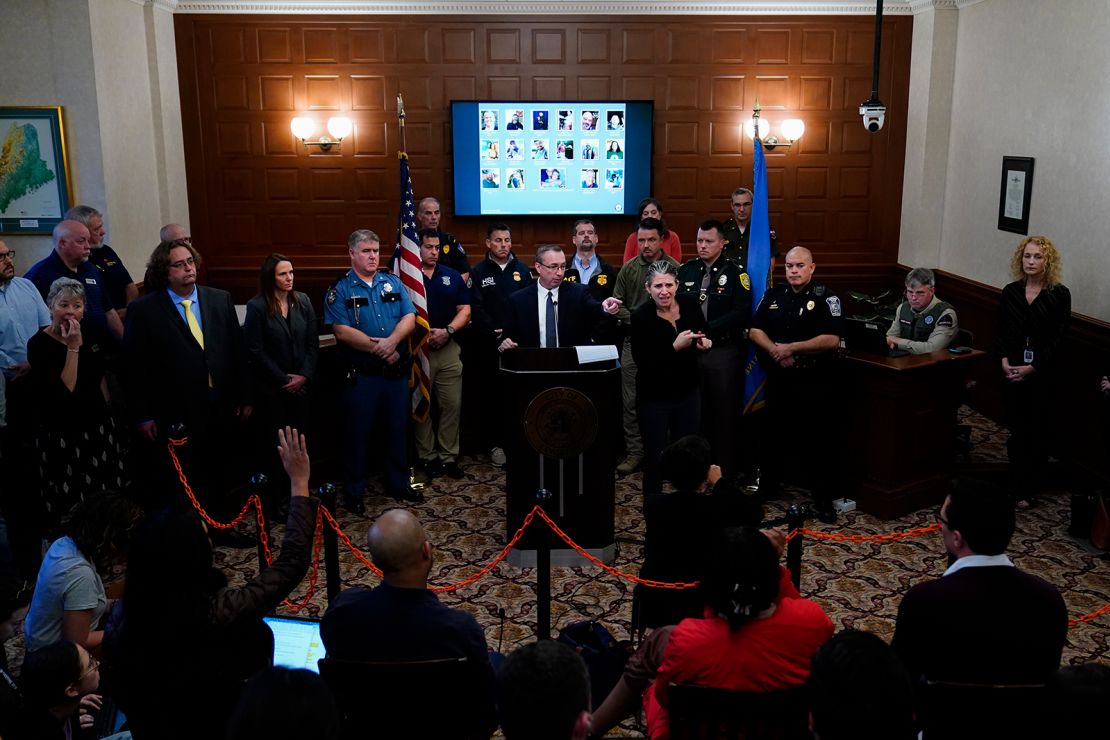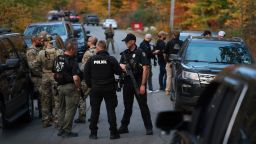New details are emerging about the US Army reservist who authorities say killed 18 people and wounded 13 others in Lewiston, Maine, last week – including previous warnings about him from the Army and his family, and two attempts by law enforcement to check on him weeks before the rampage.
The Army in July said that Robert Card, 40, “should not have a weapon, handle ammunition, and not participate in live fire activity,” after he was seen “behaving erratically” and sent for an evaluation at an Army hospital, Army spokesperson Lt. Col. Ruth Castro said.
About two months later, a deputy was sent to check on Card twice in mid-September after a soldier became concerned the reservist would “snap and commit a mass shooting,” according to a document from the Sagadahoc County Sheriff’s Department. An alert was then sent to law enforcement warning that Card was “armed and dangerous.”
That was less than six weeks before the terror unfolded in Lewiston on Wednesday evening, when Card first opened fire at the Just-in-Time Recreation bowling alley and then at Schemengees Bar & Grille about 4 miles away, authorities said.
The violence – which marked the deadliest mass shooting in the United States this year – was followed by an extensive 48-hour manhunt that ended with Card being found dead inside a recycling facility box trailer with a self-inflicted gunshot wound, authorities said.
While questions remain over what motivated the attack and why those locations were targeted, previous warnings about Card that are coming to light are raising questions over authorities’ handling of the warning signs and his access to the firearms.
“An important part of our response in the coming weeks will be to understand exactly what happened and to ask ourselves what changes are needed to protect the safety of Maine people,” Maine Gov. Janet Mills said Monday.
The mass shooting upended life in Lewiston and surrounding communities, injecting fear into the area and ripping families apart.
The?18 people killed?ranged in age from 14 to 76. They included a boy who was bowling with his father, contestants in a cornhole tournament for the deaf, and several fathers who leave behind young children.

Family contacts officials about gunman
The Sagadahoc County Sheriff’s Office was contacted on May 3 by Card’s family, who said they were concerned for his well-being and shared that he had access to firearms, documents show.
Card’s 18-year-old son told a deputy that starting around January, his father was “starting to claim that people were saying things about him, while out in public,” according to documents shared by the sheriff’s office.
His ex-wife also told the deputy that Card had “picked up 10-15 handguns/rifles” that were at his brother’s house, the document says.
The ex-wife and son said their plan was to stay away from Card, according to the documents.
After speaking with the family, the deputy spoke with representatives of the 3rd Battalion 304 Training Group and connected them with Card’s family, “who assured our office that they would ensure that Card received medical attention,” the sheriff’s department said in a statement.
Deputies sent to gunman’s home weeks before shootings
In September, an Army Reserve unit in Saco reached out to the sheriff’s office in an email to ask for a wellness check on Card.
The email says that on July 15, Card was getting beer in West Point with some soldiers when he accused the three of them of calling him a pedophile and ended up shoving a soldier and saying, “he would take care of it,” according to a letter shared by the sheriff’s office.
Card was taken to a psychiatric hospital, where he spent two weeks before being released, the letter says.
Then there was another incident.
Card and a soldier were driving home from a casino when he again started talking about people calling him a pedophile, a statement to Sagadahoc County Sheriff’s Office said.
“When [his friend] told him to knock it off because he was going to get into trouble talking about shooting up places and people, [he] punched him,” the statement said. “According to [the friend], [he] said he has guns and is going to shoot up the drill center at Saco and other places … [the friend] is concerned that [he] is going to snap and commit a mass shooting.”
The threat to the military facility in Saco led to some extra patrols,?Saco Police Chief Jack Clements told WMTW Maine, but the reservist never showed up.
The US Army told CNN the health and wellness check was requested by the shooter’s unit “out of an abundance of caution after the unit became concerned for his safety.”
“The Army takes all allegations seriously. Due to an ongoing Army investigation, we cannot go into any further details,” the email statement from Castro, the Army spokesperson, said.
A deputy went to Card’s home on September 15, and then again September 16, but didn’t see him, the sheriff’s department said.
The Sagadahoc County Sheriff’s Office sent a File 6 alert – an attempt to locate teletype – to other law enforcement agencies about Card, warning that he’s known to be armed and dangerous.?The sheriff’s office said File 6 alerts are “common and are issued by law enforcement when they are trying to locate a person.”
“Robert has been suffering from psychotic episodes & hearing voices,” the alert to law enforcement says. “He is a firearms instructor and made threats to shoot up the National Guard armory in Saco. He was committed over the summer for two weeks due to his altered mental health state, but then released… if located, use extreme caution.”
The File 6 alert was canceled on October 18 – a week before the mass shootings.
Law enforcement officials have said Card, a certified firearms instructor, had extensive training, including?land navigation and firearms.
The Sagadahoc County deputy later spoke with Card’s unit commander, “who said that Mr. Card no longer had any weapons from the reserve unit,” the sheriff’s office said.
His commander said they were trying to get treatment for Card and that “he thought it best to let Card have time to himself,” the sheriff’s office added.
The next day, on September 17, the deputy spoke to Card’s brother, who said “that he would work to secure any firearms that Mr. Card had access to,” according to the sheriff’s office.
“We believe that our agency acted appropriately and followed procedures for conducting an attempt to locate and wellness check.” Sagadahoc County Sheriff Joel Merry? said in a statement Monday.
“My office will evaluate our policies and procedures for how we conduct wellness checks with the goal of making any improvements that are in the interest of public safety while balancing the rights of individuals,” Merry added.

Maine mass shooter had access to safe containing guns, warrant says
Investigators said they believe the firearm used in the shooting rampage was legally bought in mid-July — just days before Card was hospitalized and ordered to undergo a psychiatric evaluation, according to multiple law enforcement sources.
Card’s brother had managed to change the code on Card’s garage gun safe for some period of time months ago because he was concerned about his “behavior and his possession of several firearms,” Card’s brother told law enforcement, according to a search warrant affidavit shared with CNN.
But Card still had a key to the gun safe and had access to his firearms before the shooting, the brother told authorities.
Card’s brother said that he tried to help the shooter as much as he could, and so did Card’s father, “but Robert could not be reasoned with.”
The weapon that was found inside Card’s 2013 white Subaru Outback appears to be the same one fired by the gunman at the bowling alley and a local bar, though a ballistics match has not been confirmed, sources said.
When?authorities?found Card?dead Friday night, they?found?a Smith & Wesson M&P .40 caliber handgun and a Smith & Wesson M&P 15 rifle?with?him, according to a news release from the Maine Department?of?Public Safety.
“Forensic and ballistic testing still needs to be conducted” on the weapons, according to the release.
Although “there’s a mental health component to this,” that would not necessarily mean Card was not eligible to buy a gun, Maine Public Safety Commissioner Michael Sauschuck has said.
Maine gun laws do not prohibit a person from buying a gun based strictly on a mental health diagnosis or treatment, according to Sauschuck.
“Based on what I’ve heard through conversations this morning, I’m told that we don’t have access to any ‘forcibly committed for treatment’ information in reference to Mr. Card,” Sauschuck said Saturday.
Without being required by a court to receive mental health treatment, Card’s name likely would not be flagged during a firearms purchase. “If that didn’t happen,” Sauschuck said, “then … the background check is not going to ping that this person is prohibited.”
The Bureau of Alcohol, Tobacco, Firearms and Explosives also said it wasn’t aware of any records that would have stopped Card from buying a firearm.
A gun shop had declined to sell Card a silencer months before the shooting after he?responded “yes” to the question “Have you ever been adjudicated as a mental defective OR ever been committed to a mental institution?”?on?a form, the?ATF?told CNN in a statement.
“ATF?was not made aware of Card’s?response to the mental status question?on the?ATF?Form 4473 prior to the mass shooting incident on October 25, 2023,” the ATF said. “Moreover, prior to October 25, 2023,?ATF?was not aware of any other record or information that would have prevented Card?from passing a federal background check when acquiring a firearm from an FFL.”
Warrants offer new details on Card’s connection to restaurant targeted
Documents released Tuesday by Maine state officials detail statements Card’s siblings made to police about him experiencing delusions after a recent “bad break-up,” according to an arrest affidavit shared with CNN.
On the night of the shootings, Card’s sister called authorities to identify him as the gunman in the surveillance images released by authorities, according to the affidavit.
The sister said that Card had “believed there was a conspiracy against him,” and was alleging that Just-in-Time Recreation, Schemengees and two other businesses were “broadcasting that?Robert?was a pedophile.”
Schemengees is also a location Card had frequented, and it’s where he had met his ex, according to the affidavit.
The documents also provide a timeline of some of the key investigative steps authorities took during the manhunt for the gunman last week.
Police found the gunman’s car around 10 p.m. on October 25, the night of the shooting. They confirmed it was registered to him shortly after that, according to the affidavit.
A judge approved the warrant at 9:38 a.m. the next day for searches of the?Subaru?and for Card’s home in the nearby town of Bowdoin.
Investigators executed a search warrant at Card’s home that day, looking for computers, notes, weapons and any evidence that might indicate a plan for the shootings, law enforcement sources previously told CNN.
He was found the next evening with a self-inflicted gunshot wound inside a recycling facility box trailer?about 10 miles from Lewiston, authorities have said.
CNN’s Mark Morales, Sabrina Souza, Evan Perez, Linh Tran, Sara Smart and Andy Rose contributed to this report.















